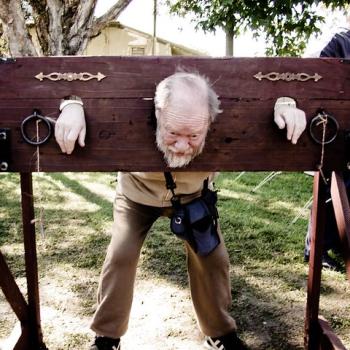I'm intrigued by how specific John is with his responses. He does not give his questioners a "one size fits all" solution, as do so many preachers who flavor their sermons with fire. Those who have clothing and food need to share them with those who don't, John says. When the tax collectors ask what they should do, he tells them, "Collect no more than the amount prescribed for you." When soldiers ask him, John tells them, "Do not extort money from anyone by threats or false accusation, and be satisfied with your wages." To each group, to each condition presented him, John provides counsel tailored distinctly to who they are.
Forget fire, forget winnowing forks, forget threshing floors: amid our daily lives, is there anything more unsettling than receiving a clear word about what it is that we're meant to do in this world? Is there anything that risks taking us deeper into our insecurities, into our fears, into the dark unknown than when someone who sees and recognizes and knows us, then challenges us to be the person whom God has created and called us to be? And is there anything more full of wonder and hope?
I think of Audre Lorde, who, in a conversation with her fellow poet Adrienne Rich, said, "Once you live any piece of your vision it opens you to a constant onslaught. Of necessities, of horrors, but of wonders too, of possibilities."
This, finally, is what John the Baptist, this preparer of the way, is offering to his hearers: wonders. Possibilities. The invitation to be initiated into a relationship with God's own incarnate self. The fire, the winnowing fork, the threshing floor: these are important, but they are not John's primary point. As ever, John in his fierce fashion is pointing to -- making the way for -- the One who comes. And this One comes not for the purpose of terrifying us but of loving us.
Terror may get our attention. It's one way of telling a story. In the most adept hands, it can be a compelling form in which to illuminate the complexities involved in the struggle of good against evil. Yet terror alone -- fear of hellfire and damnation -- is not enough to sustain a lasting relationship with Christ. Horror, by itself, is not the path to lead us into heaven. Only love -- the truest fire -- can do this.
In this season, we remember and celebrate this fierce and fiery love: the love that created us; the love that garbed itself in our own flesh and came among us; the love that beckons us to respond by discerning and doing what it is that God formed and fashioned us, in all our particularity, to do; the love that we will one day see and know in its completeness.
So what should we do, then? How do you carry this question -- this question the crowd asked of John -- in this season? How do you discern God's longing for your life? To whom do you listen as you seek an answer to this question?
May the presence of love attend your Advent days.
This article and artwork originally appeared at The Advent Door and is reprinted with permission.
Jan Richardson is a writer, artist, minister, and director of a company called The Wellspring Studio, LLC. Her favorite projects are those that intertwine words and images, including her small press, Wanton Gospeller Press, through which she designs and hand-binds books that incorporate her art and writing. Visit her virtual studio at janrichardson.com. Her two blogs are The Painted Prayerbook and The Advent Door.




